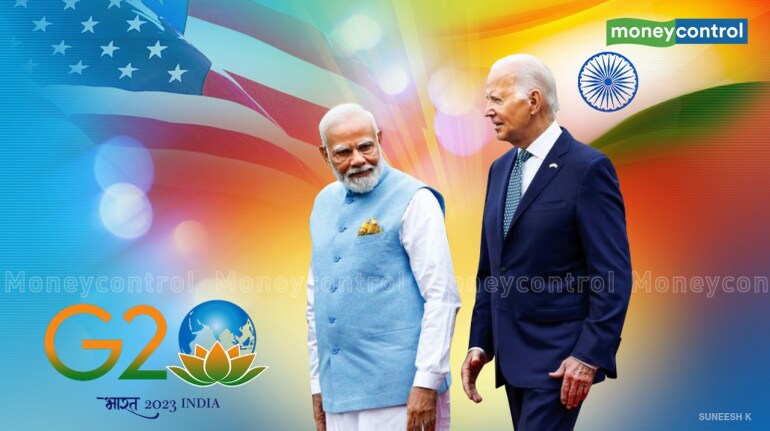



US President Joe Biden and Prime Minister Narendra Modi will meet in New Delhi on September 8 to give a further push to their relations that are growing into a robust partnership.
This will be the first bilateral meeting between the two leaders in India. Modi and Biden met when the Indian Prime Minister went on his first state visit to the United States in June this year.
Donald Trump was the last US President to visit the country in 2020.
Biden will also participate in the two-day G20 summit in New Delhi from September 9.
The bilateral meeting between Biden and Modi will draw more attention because of Chinese President Xi Jinping’s decision to stay away from the G20 summit.
Russian President Vladimir Putin will also not be present in New Delhi for the summit.
China will be represented by its Premier, Li Qiang, and Russia by its Foreign Minister, Sergey Lavrov, at the summit.
Modi is likely to invite Biden and the other Quad leaders, Japanese Prime Minister, Fumio Kishida, and his Australian counterpart, Anthony Albanese, for next year’s Republic Day celebrations.
If Biden comes, it will be a unique gesture as no American President has visited India in such quick succession.
The only US President to have visited India twice was Barack Obama who came in 2010 and 2015, as the first American President to be honoured as Chief Guest for the Republic Day celebrations.
Biden’s second visit can be indicative of his commitment to a strong strategic partnership with India in the face of China’s growing assertion in Asia and the Indo-Pacific region.
Media reports suggest that New Delhi and Washington are working on an ambitious number of deliverables for their bilateral engagement – a possible nuclear pact on small modular nuclear reactors, an academic programme for Indian students, a drone deal and progress of the defence deal on jet engines that has to be approved by the US Congress.
A joint humanitarian aid for Ukraine, a more liberal visa regime and new consulates in each other’s countries are also expected to feature at their talks.
The Indian Express claimed that Indian and US officials are in hectic negotiations for framing a robust and outcome-oriented joint communique for President Biden’s first visit to India.
Other reports suggest that due to India’s numerous diplomatic commitments during the summit and time constraints, the bilateral engagement is expected to be limited in scope.
Growth in bilateral ties from 2000 onwards
The growth in Indo-US ties began to show an upward swing since American President Bill Clinton’s visit to India in 2000.
He was the first US President to come to the country in 22 years after President Jimmy Carter’s visit in 1978.
But since Clinton, all successive American Presidents, Democrat and Republican, came to India.
Clinton was followed by George W. Bush, Obama, Trump, and now Biden.
Their visits were a signal that cutting across party lines, both the Democratic and the Republican parties want a strong partnership with India.
China and more
A key element in the Indo-US bilateral ties has been China’s aggressive rise in Asia. The US has identified China as an existential threat and the only country capable of challenging its global hegemony.
China’s unilateral attempt to change the status quo at the disputed Sino-Indian boundary and its hegemonistic designs in the region has led the US and India to share common concerns about China.
But there are other factors that have made India appealing to the American leadership. India is seen as an attractive market and investment destination and as a potential centre for sophisticated technology and production.
Besides, its growing prowess in digital and space technology and international solar alliance initiative has been widely hailed.
In addition, the ability of India’s strong army and navy to hold their own in the face of Chinese aggression at the border, has impressed the US administration and American lawmakers alike.
Areas of contention
But despite the growing bonhomie in relations, both countries also have fundamental differences on key issues.
India’s refusal to condemn Russia for invading Ukraine and imposing sanctions on Moscow have diluted Biden’s bid to project the ongoing war as a fight between democracy and autocracy.
Also, despite its strained ties with China, India has refused to commit itself to support America militarily on the Taiwan issue against Beijing.
The US too, has ignored India’s concern while resuming supply of F-16 fighter aircrafts and other weapons to Pakistan to revive defence cooperation with Islamabad.
Moreover, some Democrat lawmakers are extremely critical about Modi and India’s democratic backsliding.
But Biden has ignored such criticism and invested heavily on India as a reliable strategic partner.
However, whether the strong momentum will be maintained beyond Biden’s term, remains a matter of speculation.
Discover the latest Business News, Sensex, and Nifty updates. Obtain Personal Finance insights, tax queries, and expert opinions on Moneycontrol or download the Moneycontrol App to stay updated!
Find the best of Al News in one place, specially curated for you every weekend.
Stay on top of the latest tech trends and biggest startup news.